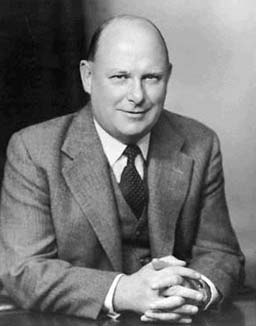


 تاريخ الرياضيات
تاريخ الرياضيات
 الرياضيات في الحضارات المختلفة
الرياضيات في الحضارات المختلفة 
 الرياضيات المتقطعة
الرياضيات المتقطعة
 الجبر
الجبر
 الهندسة
الهندسة 
 المعادلات التفاضلية و التكاملية
المعادلات التفاضلية و التكاملية 
 التحليل
التحليل
 علماء الرياضيات
علماء الرياضيات |
Read More
Date: 21-9-2017
Date: 18-9-2017
Date: 21-9-2017
|
Died: 7 July 1975 in Cambridge, Cambridgeshire, England

William Hodge's parents were Janet Vallence, whose father owned a confectionary business in Edinburgh, Scotland, and Archibald James Hodge who worked in the property market. William was the second of his parents' children, having one older brother and one younger sister.
He was educated at George Watson's College in Edinburgh, entering in 1909 and studying there until 1920. While at the College he won a mathematical bursary which allowed him to progress to become a student at Edinburgh University. He was taught there by Whittaker who advised him to continue his studies at Cambridge. After graduating with First Class Honours in mathematics from Edinburgh in 1923, he entered St John's College, Cambridge. His studies at Cambridge were financed by a van Dunlop bursary which he had won from Edinburgh and a scholarship from St John's College. After gaining distinction in the Mathematical Tripos of 1925 he went on to win a Smith's Prize and spent a further year researching at Cambridge financed by a Ferguson scholarship.
Hodge was appointed to an assistant lectureship at the University of Bristol in 1926 and spent five years there. During this period he married Kathleen Anne Cameron, the daughter of the manager of the Edinburgh branch of Oxford University Press. They had one son and one daughter.
His main mathematical interests were in algebraic geometry and differential geometry. In 1930 he applied ideas of Lefschetz to solve a problem posed by Severi. That same year he gained election to a fellowship at St John's College, Cambridge. In the following year, after winning an 1851 Exhibition Studentship, he went to Princeton so that he could work with Lefschetz who he greatly admired. While in the United States Hodge spent two months at Johns Hopkins University studying with Zariski.
After his visit to the United States, Hodge returned to Cambridge in 1932. He was appointed as a university lecturer in the following year and, in 1935, was elected to a fellowship at Pembroke College, Cambridge. During this period he developed the relationship between geometry, analysis and topology and produced some of his best remembered work on the theory of harmonic integrals. For these contributions Hodge won the Adams Prize in 1937 and Weyl described this contribution as:-
... one of the great landmarks in the history of science in the present century.
Hodge published a polished account of his important theory in 1941. This work marked an important change in direction for the Cambridge school of geometry which, under Baker's leadership, had become somewhat isolated from other areas of mathematics.
In 1936 Hodge had been appointed as Lowndean Professor of Astronomy and Geometry, succeeding Baker, and he held this chair at Cambridge until 1970. He continued to work at Cambridge during World War II, but took on extra duties to compensate for the shortage of staff who were away in the forces; in particular he acted as bursar of Pembroke. In 1958 he was appointed as Master of Pembroke, holding the post until he retired from university life in 1970.
Hodge was one of the originators of the British Mathematical Colloquium, an annual conference which visits different British universities. He also played a major role in setting up the International Mathematical Union in 1952, being elected as vice-president from 1954 to 1958. In 1959 the London Mathematical Society awarded him their De Morgan Medal. He was elected to the Royal Society of London in 1938, received the Society's Royal Medal in 1957, and was vice-president from 1959 to 1965. The Royal Medal was awarded in:-
... recognition of his distinguished work on algebraic geometry.
He was also awarded the Copley Medal by the Royal Society in 1974:-
... in recognition of his pioneering work in algebraic geometry, notably in his theory of harmonic integrals.
He received many other honours. He was elected to the Royal Society of Edinburgh, and the American National Academy of Sciences. He was awarded honorary degrees by many universities including Bristol (1957), Edinburgh (1958), Leicester (1959), Sheffield (1960), Exeter (1961), Wales (1961), and Liverpool (1961). He was knighted in 1959.
He is described in [2] as follows:-
Hodge was very unlike the conventional picture of a mathematician. Jovial, informal and down-to-earth, he could easily have passed for a businessman.
Atiyah writes that Hodge was:-
... modest and unassuming. Genial in manner and temperament, endowed with sturdy Scots common sense, he got on well with his colleagues and students.
Articles:



|
|
|
|
دراسة يابانية لتقليل مخاطر أمراض المواليد منخفضي الوزن
|
|
|
|
|
|
|
اكتشاف أكبر مرجان في العالم قبالة سواحل جزر سليمان
|
|
|
|
|
|
|
اتحاد كليات الطب الملكية البريطانية يشيد بالمستوى العلمي لطلبة جامعة العميد وبيئتها التعليمية
|
|
|